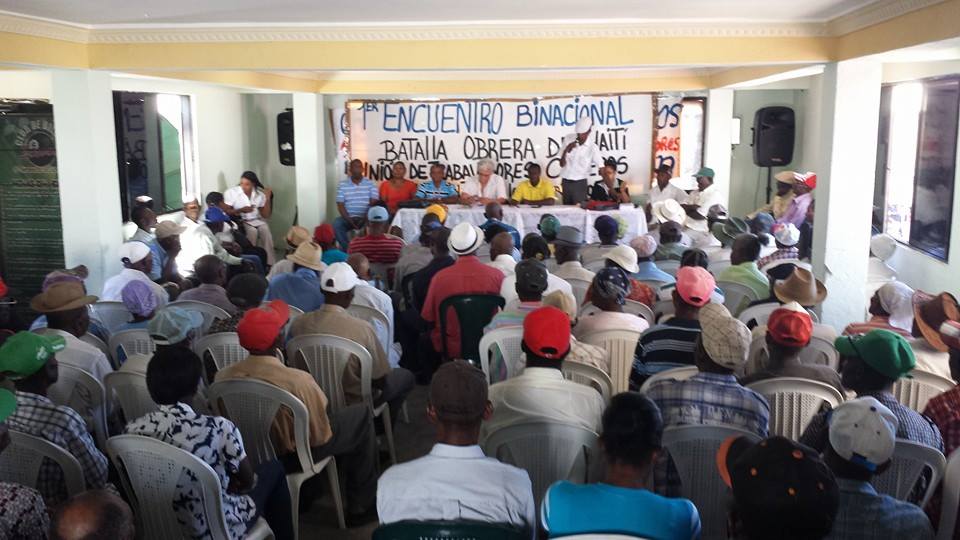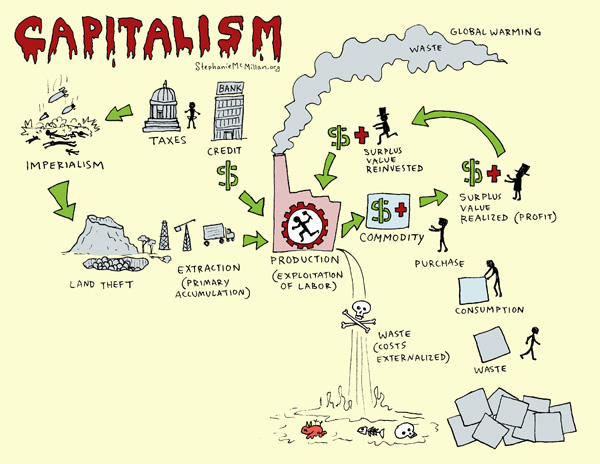
by Deep Green Resistance News Service | Feb 15, 2017 | White Supremacy, Worker Exploitation
by Alex Jensen / Local Futures
While misogyny, racism, and ethnic taunts were conspicuous signposts on Donald Trump’s path to the White House, much of that road was paved with “populist”, “anti-establishment” and “anti-globalization” rhetoric. Trump’s inaugural address featured numerous populist lines (e.g. “What truly matters is not which party controls our government, but whether our government is controlled by the people”), attacks on the status quo (“The establishment protected itself, not the citizens of our country”), and barbs aimed at globalization (“One by one, the factories shuttered and left our shores, with not even a thought about the millions upon millions of American workers left behind.”)
Are these themes accurate predictors of how Mr. Trump and his administration will govern for the next four years?
Hardly. Long before the election, it was widely pointed out that the populist platitudes issuing from the silver-spooned mouth of a billionaire plutocrat represented little more than elite hucksterism. [1] Of course, post-election, the band of fellow billionaire corporate rascals and knaves Trump assembled for his cabinet and close advisors should have put an end to this fatuous ‘anti-establishment’, ‘populist’ charade once and for all. As one observer noted, “Trump’s cabinet has begun to resemble a kind of cross between the Fortune 500 rich list, a financier’s reunion party and a military junta.” [2]
What about Trump as an ‘anti-globalization’ crusader? Apart from the inconvenient fact that his own loot was built upon global outsourcing and the exploitation of cheap labor abroad for which ‘globalization’ is shorthand, the fact is that a “former Chamber [of Commerce] lobbyist who has publicly defended NAFTA and outsourcing more generally was appointed to Trump’s transition team dealing with trade policy.” [3] Did anyone really buy the notion that the swaddled child of corporate globalization had morphed into a working-class hero battling the ravages of that same globalization?
Some of Trump’s voters were undoubtedly among those who have been economically marginalized by globalization and wealth inequality – the common folk on whose behalf populism historically emerged. No doubt some allowed Trump’s populist, anti-globalization legerdemain to blind them to his scapegoating of fellow displaced working-class victims of globalization – aka immigrants from non-European countries. That these constituted the majority of his voters, however, is questionable. As Jeet Heer argued convincingly back in August,
“Rather than a populist, Trump is the voice of aggrieved privilege—of those who already are doing well but feel threatened by social change from below, whether in the form of Hispanic immigrants or uppity women. … Far from being a defender of the little people against the elites, Trump plays to the anxiety of those who fear that their status is being challenged by people they regard as their social inferiors.” [4]
In other words, Donald Trump is no populist, but an “authoritarian bigot”[5], and his election represents the victory of the rich – and a victory for corporate globalization. He is “not an outlier, but instead the essence of unrestrained capitalism.” [6] (To be clear, this should in no way be read as an implicit endorsement of the neoliberal Democratic Party, whose economic and trade policies are largely pro-corporate as well.)
To see Trump as an anti-globalization crusader is to misunderstand one of the main structural features of globalization itself: the concentration of wealth by fewer and fewer corporations and the consequent widening of the gulf between rich and poor. According to a recent report, [7] here are some relevant trends from 1980 to 2013 – roughly the period of hyper globalization:
- Corporate net profits increased about 70 percent;
- Three-quarters of this increase went to the largest corporations (those with over $1 billion in annual sales);
- Just 10 percent of publicly listed companies account for 80 percent of corporate profits; the top quintile earns 90 percent;
- Two-thirds of 2013 global profits were captured by corporations from rich, industrialized countries;
- During this period in these same “rich countries”, labor’s share of national income has plummeted. Needless to say, labor in poorer countries has not fared better – indeed, exploitation of labor’s “cheapness” in the poorer countries is the sine qua non of this spasm of corporate profits.
As Martin Hart-Landsberg explains in his summary of the report, “the rise in corporate profits has been largely underpinned by a globalization process that has shifted industrial production to lower wage third world countries, especially China; undermined wages and working conditions by pitting workers from different communities and countries against each other; and pressured core country governments to dramatically lower corporate taxes, reduce business regulations, privatize public assets and services, and slash public spending on social programs.” [8]
This strategy has not “helped lift hundreds of millions to escape poverty over the past few decades”, as is repeatedly, unquestioningly claimed in the mainstream media. [9] As scholar Jason Hickel has shown, such a claim rests on propagandistic World Bank-sponsored poverty statistics; if poverty were to be measured more accurately, “We would see that about 4.2 billion people live in poverty today. That’s more than four times what the World Bank would have us believe, and more than 60% of humanity. And the number has risen sharply since 1980, with nearly 1 billion people added to the ranks of the poor over the past 35 years.” [10]
Additionally, inequality has reached nauseating heights: the latest analysis by Oxfam shows that “Eight men own the same wealth as the 3.6 billion people who make up the poorest half of humanity.” [11] Globalization – an abbreviated way of describing the worldwide evisceration of regulations hampering corporate profits and the institutionalization of those that enhance them – is an engine of extreme inequality and corporate power, within and between countries, full stop. It is not cosmopolitanism, humanism, global solidarity, multicultural understanding and tolerance, or any of the other noble liberal virtues claimed for it by its votaries. In fact, while a ‘borderless’ world was seen as the pinnacle of the globalization project, physical barriers at the world’s borders have actually increased by nearly 50 percent since 2000 [12] – with the US, India and Israel alone building an astounding 5,700 km of barriers. [13]
Widespread hostility towards globalization by the working class in ‘rich countries’ is understandable and justified. The problem is that this animosity is being misdirected against fellow working-class victims of corporate profiteering (“immigrants”, “the Chinese”), and not against the banks and corporations that are the source of working-class misery. This is the strange creature called ‘right-wing anti-globalization’, or, ‘right-wing populism’ – concepts that seem rather contradictory insofar as right-wing politics is about defending and strengthening status quo arrangements of power, privilege and hierarchy. Anti-globalization, on the other hand, is about challenging the gross inequality and injustice of the status quo; and populism – historically at least – is supposed to be about advancing the interests of common people and creating a more egalitarian society. [14]
Nonetheless, it is common in the mainstream media for ‘anti-globalization’ to appear on the ugly right-wing and reactionary side of a simplified binary ledger of political ideologies. It is listed, almost automatically, alongside such distasteful qualities as “inward-looking” and “anti-immigrant”, while the opposite side is ascribed noble qualities like “tolerance” and “solidarity”. This is merely a recycling of the popular (and very much corporate-sponsored) notion of globalization-as-humanizing-global-village. This Thomas Friedman-esque framing works to deflate the would-be critic of corporate globalization by threatening to tar her by association with reactionaries and xenophobes.
To accede to this binary framing would be a grave error, since it further empowers the existing system of corporate exploitation and wealth concentration. However, because there is undeniably an element of the anti-immigrant, xenophobic right that is also – at least rhetorically – anti-globalization, it is absolutely essential for the left to articulate in the clearest terms possible an anti-globalization stance rooted in international solidarity, intercultural openness and exchange, environmental justice, pluralism, fraternity, solidarity, and love, and to continually expose the fact that globalization is intolerant of differences in its relentless dissemination of a global consumer monoculture. In other words, the right should not be allowed to hijack the anti-globalization discourse, and contaminate and confuse it with racist, anti-immigrant sentiment, nor let localization – the best alternative to globalization – become equated with nativism, nationalism, xenophobia etc. It is unfortunate that we have to do this, since peoples’ movements against globalization and for decentralization/re-localization have already clearly drawn this distinction, indeed emerged in large measure in opposition to global injustice. But do it we must, since the corporate media is happily using the rise of the right-wing to discredit the spirited, leftist opposition to globalization that has stalled such corporate power grabs as TPP, CETA, and TTIP.
Should the left make common cause with those on the right when it comes to opposing globalization, irrespective of our profound opposition to the rest of the rightist agenda? Can we hold our noses and engage with this strange bedfellow to slay our ‘common’ foe, globalization? I do not think so. Not only is right-wing anti-globalization based on a deeply flawed and internally incoherent analysis, more importantly the political expediency of the implicit message – “as long as you join us in opposing corporate free trade treaties, your xenophobia, racism et al. can be temporarily ignored and tacitly tolerated” – is noxious and inexcusable.
Fortunately, a number of writers and activists have already been busy on the critical project of framing an inclusive anti-globalization stance. Chris Smaje, agrarian and writer of the Small Farm Future blog in the UK has spelled out a vision of “left agrarian populism” that is genuinely anti-establishment and pro-people (all people), is based on and strengthens local economies, and is fiercely internationalist. [15] Localist and internationalist? Yes. Localization of economic activity is, perhaps counter-intuitively, supportive of greater global collaboration, understanding, compassion and intellectual-cultural exchange, while corporate-controlled economic globalization has hardened, and even produced, cultural/national friction and competition.
Political theorist Chantal Mouffe has similarly acknowledged the right-wing hijacking of legitimate political discontentment against corporate elitism across Europe, the answer to which, she says, must involve “the construction of another people, promoting a progressive populist movement that is receptive to those democratic aspirations and orients them toward a defense of equality and social justice. Conceived in a progressive way, populism, far from being a perversion of democracy, constitutes the most adequate political force to recover it and expand it in today’s Europe.” [16]
Degrowth scholar-activists Francois Schneider and Filka Sekulova have, in line with Smaje’s left-green localism-populism, articulated the important concept of ‘open-localism’ or ‘cosmopolitan localism’. “Open-localism”, they write, “does not create borders, and cherishes diversity locally. It implies reducing the distance between consumer and producers … being sensitive to what we can see and feel, while being cosmopolitan”. [17] These visions, and many other related ones, provide an important foundation for social justice and environmental activists to build upon in boldly reclaiming the anti-globalization narrative and resistance in these difficult times.
Alex Jensen is Project Coordinator at Local Futures/International Society for Ecology and Culture. He has worked in the US and India, where he co-ordinated Local Futures’ Ladakh Project from 2004-2015. He has also been an associate of the Sambhaavnaa Institute of Public Policy and Politics in Himachal Pradesh, India. He has worked with cultural affirmation and agro-biodiversity projects in campesino communities in a number of countries, and is active in environmental health/anti-toxics work.
Endnotes
[1] See for example Naureckas, Jim, “Hey NYT – the ‘Relentless Populist’ Relented Long Ago”, Fairness and Accuracy in Reporting, January 22, 2017; Lynch, Conor, “Don’t be fooled: Trump’s populist economic rhetoric is a fraud”, Salon, July 9, 2016; Paarlberg, Michael, “Donald Trump is a pretend populist – just look at his economic policy”, The Guardian, August 10, 2016.
[2] Warner, J. (2016) “Donald Trump’s cabinet of oil men and generals is just what’s needed to get US out of its rut “, The Telegraph, December 16, 2016.
[3] Hart-Landsberg, M. (2016) ‘Confronting Capitalist Globalization’, Reports from the Economic Front.
[4] Heer, J. (2016) ‘Donald Trump Is Not a Populist. He’s the Voice of Aggrieved Privilege’, New Republic, 24 August.
[5] Ibid.
[6] Cuadros, A. (2016) ‘The Other Buffett Rule; or why better billionaires will never save us’, The Baffler, No. 33.
[7] McKinsey Global Institute (2015). “Playing to Win: the new global competition for corporate profits”, September 2015.
[8] Hart-Landsberg, M. (2016) ‘The Trump Victory’, Reports from the Economic Front, 18 November, 2016.
[9] See for example Pylas, P. and Keaten, J. (2017) ‘Will Trump end globalization? The doubt haunts Davos’ elite‘, Associated Press, January 20, 2017.
[10] Hickel, J. (2015) “Could you live on $1.90 a day? That’s the international poverty line”, The Guardian, November 1, 2015.
[11] Oxfam (2017) ‘Just 8 men own same wealth as half of humanity’, Oxfam International Press Release, 16 January, 2017.
[12] Harper’s Index, ‘Percentage by which the number of international borders with barriers has increased since 2014: 48’, Harper’s Magazine, January 2017.
[13] Jones, R. (2012) Border Walls: Security and the War on Terror in the United States, India and Israel, London: Zed Books.
[14] cf. Heer 2016, op.cit.
[15] Smaje, C. (2016) ‘Why I’m still a populist despite Donald Trump: elements of a left agrarian populism’, Small Farm Future, 17 November.
[16] Mouffe, C. (2016) ‘The populist moment’, Open Democracy, 21 November.
[17] Schneider, F. and Sekulova, F. (2014) ‘Open-localism’, paper presented at the 2014 International Conference on Degrowth, Leipzig, Germany.

by DGR Colorado Plateau | Dec 17, 2015 | Worker Exploitation, Worker Solidarity
By One Struggle
On what I earn, I can’t afford shoes… We are poor, poor, poor. There are days we go to bed without food. – Batey worker from the film, “The Price of Sugar”
In the sugar plantations or bateyes of Dominican Republic, cane cutters often work barefoot. They can’t afford shoes. They can barely afford food, for that matter, despite the fact that they often work a minimum of 12 hours a day, doing the back-breaking work of cutting sugar cane by hand.
On the other side of the border that divides Hispaniola, Haitian garment workers in Port Au Prince recently blockaded a Korean factory because of bounced paychecks. For years, Haitian garment workers have been fighting wage theft and to be paid the inadequate legal minimum wage – still not enough to live off of.
Whatever the product is – the pair of pants, the t-shirt – we are the ones producing it. We labor hard, and don’t get paid. – Haitian garment worker of SOTA in Port Au Prince
This week Unión De Trabajadores Cañeros De Los Bateyes (Union of the Bateyes of Sugarcane Workers) and Sendika Ouvriye Takstil ak Abiman (SOTA) (Union of Textile and Garment Workers) will meet to discuss their common struggles against exploitation.
Specifically, they are meeting about recent actions of the DR government to strip people of Haitian descent of their citizenship. This has mostly affected the poor – cane cutters, street vendors, and service laborers. In bringing attention and their perspective to this struggle, the groups’ intentions are to put down false divisions of racism and nationalism, with the goal of working together against their common enemy – the Haitian and Dominican ruling classes.

SOTA is affiliated with the autonomous workers’ organization, Batay Ouvriye (BO) (Workers Fight), which will host a series of meetings, a press conference, and direct action in Port Au Prince.
According to one of the event organizers, “They will be three Haitian cane workers, one Dominican cane worker and the coordinator of the union. The presence of the Dominican cane worker is to deny the nationalist option and to put the class situation in concrete relief, in contrast to the bourgeois organizations here who pretend to defend their ‘compatriots.’”
There is a long history of animosity between Haiti and Dominican Republic. Both nationalism and racism are deep rooted. The DR won its independence, not from European colonialists, but from Haiti. Since then, Haitians living in the DR have faced discrimination, and thousands of Haitians and Dominicans of Haitian descent were massacred under Dominican dictator, Rafael Trujillo.
In 2013, the Dominican Supreme Court retroactively withdrew citizenship from anyone born in the DR to undocumented immigrants, with the provision that persons who submitted the proper documentation could apply for legal residency. The deadline for this application was summer 2015. However, many who submitted this paperwork, along with hundreds of dollars in fees, never received any notice or proper documentation from the government. Thousands of Haitians and Dominicans of Haitian descent left the DR, or were rounded up and dropped at the Haitian/Dominican border, often without being able to gather their belongings or to alert their families.
So now, there are hundreds of thousands of people rendered stateless, living in temporary shanty-towns along the border. They’ve been told that if they get documentation proving their country of origin from the Haitian government, then they can apply for Dominican citizenship or work visas. In fact, the Haitian government was paid by the Dominican government to facilitate this process, but Haitians living in limbo on the border have seen no results from this transaction.
Another issue affecting cane workers and low-wage laborers is that for years many paid into social security in the DR. Once they stopped working, they apply for their pensions, submitting the required paperwork to DR government and received nothing. Or, if they’ve been deported, they have no means of claiming their pension either.
This situation is not just about racism or nationalism. It is an issue of the ruling classes of both countries exploiting and stealing from the poor and working class. This summer, many demonstrations were held, especially in New York and Miami, with calls for travel boycotts against the DR and urgent appeals to avert a humanitarian crisis. Most of these demands have been voiced from people outside of the DR/Haiti, or removed from the exploitation of the bateyes and the temporary shanty-towns.
The aim with this series of meetings between workers from both countries is to bring attention to calls and demands led by the workers and people directly affected by these struggles. These are the people whose demands should be amplified, and calls for action should be followed.

Here in the U.S. we use Dominican sugar in our coffee every day. Our clothing is made in sweatshops, often sewn in Haiti (thanks to HELP and HOPE Acts). Capitalism and imperialism give us no choice, no say in how goods are produced. Our sugar and our clothing are the results of wage theft and a politic of misery for the working class in dominated countries. Boycotts and conscious consumerism pretend that with our purchasing, exploitation can be ameliorated. In reality, it is merely shifted to another part of the world. We need to understand the dynamics of capitalism/imperialism, its inherent exploitation, and we must address these issues from the interests of the working class. Who better to lead this effort than the workers themselves?
Read more at One Struggle

by DGR Colorado Plateau | Dec 10, 2015 | Colonialism & Conquest, Worker Exploitation
By One Struggle
“That country is poor.”
Translation: Your country had bountiful natural resources until we beat the hell out of you and stole everything.
“Their government is incompetent. They are unable to govern themselves.”
Translation: We invaded you, killed a bunch of you and set the rest at each other’s throats, and installed a dictator who’s helping us steal everything. But it’s your own fault that your country is a mess.
“The US helps people all over the world.”
Translation: If you don’t want our products or loans because they’ll ruin your economy, we’ll twist your arm until you take them. We’ll charge you for interest, inputs and maintenance far beyond the value of our original ‘assistance,’ and label ourselves saints and you ungrateful.

“Developing nations should be integrated into the global economy.”
Translation: First we’ll steal all your natural resources and destroy your economy, and then when your people are starving we’ll give them sweatshop jobs in our factories.
“We pay low wages but their living expenses are lower so it all works out.”
Translation: I’ll tell that lie to pacify domestic consumers, but really I don’t care if you starve.
“Okay, their lives are hard, but they should be grateful we gave them a job.”
Translation: You have no right to dignity, safety, to send your kids to school. I need that extra profit to pay for my fifth mansion in Switzerland.
“We are bringing democracy to the world.”
Translation: We’ll crush you.
“Without our help, they’d fall apart. They need us.”
Translation: We don’t produce anything, but we’re violent sociopaths loaded up with guns and nuclear weapons, so we’ll keep on sucking your blood as long as we can get away with it. If you ever stop us, we’ll die.

by Deep Green Resistance News Service | Aug 10, 2013 | White Supremacy, Worker Exploitation
By Adon Apamea / Deep Green Resistance Middle East & North Africa
Dubai is an interesting city. A thriving futuristic metropolis in the heart of the desert considered to be the crown jewel of modernity with indoor ski resorts, gulf courses, fully computerized metros, giant air-conditioned shopping malls, and the tallest skyscrapers in the world.
Built upon the oil money and over the desert’s sands starting from 1970s, Dubai is rootless more than any other city in the world. With a few thousand original natives, Dubai attracts millions of people today from around the world who come to live and work, or to just take a look at the legendary city.
The dispossessed, like yours truly, come to Dubai for work when all other possibilities are blocked. Some of the latter enter the city with the dream of doing big money. Some come out of desperation while the rest are forced into cheap labor or sold as slaves for the sex industry.
The possessed – those who have loads of money and are possessed with making more money and power, also come to Dubai. Most of them come to squeeze the life out of the first group for profit while some just want to show off their fortune or discover what the fuss is about.
The dispossessed sit on the bottom while the possessed sit on top. The hierarchy looks something like this: native Emirati men – specifically those possessing money, power and oil – sit on top, white western men sit right next or beneath them managing the growth of one of the fastest cities in the world. Some brown men, mainly from Pakistan and India, sit in the third row, and more whitish people and some Arabs sit somewhere in the fourth row making the middle management and landlords of the city. East Asians sit on the fifth row doing all the blue collar jobs, answering phone calls, making deliveries, and fixing air conditioners. And last a majority of Pakistanis, Indians, Bengalis and Sirilankans sit in the last row, building the city in the scorching heat, cleaning houses, and opening doors. In the shadows, an unknown number of women, from all nationalities of the third world are sex slaves, without passports or means to escape their slavery.
In any work, being a white westerner ensures you get a salary four or five folds the one that any person of a brown nationality would get for exactly the same job. An IT engineer of Indian nationality might get a salary of 1500 USD. A British would get 6000 USD for the same job in the same company, just for being white. This is how the system works. Everyone knows it; brown people make jokes about it. White people rarely laugh. In Dubai you discover that racial hierarchy isn’t a theory in a book.
The dispossessed, however, largely share an illusion absent amongst the possessed, that they can join the upper class if they work hard enough. The banks are especially fond of fostering this hope: it just takes a few weeks of living in Dubai to become eligible for a fat bank loan. Agents will knock on your door, call your phone, and come to your office trying to sell you easy loans and premium credit cards. You can wake up a poor man in the morning, and in the afternoon walk from the doors of a bank with a small fortune.
And thus the mighty machine continues its march onward, greased by the sweat and blood of poor people… and by their dreams as well.
Being in the desert, everything in Dubai is imported and packaged in neat plastic or metal containers: water, food, cars, buildings, furniture, and people. The world’s most exotic fruits and foods are available at any supermarket year round, but everything tastes the same. High-tech electronics and the most sophisticated cars in the world are all here too. Even portable ACs, in case you wanted to sit on the balcony in the summer’s desert and you disagree with the temperature. One building in Dubai for example, Burj Khalifa, spends the equivalent of 29.000.000 lb (13.000 tons) of melting ice in one day on cooling. Dubai has 80.000 multistory buildings.
You don’t even have to go to the grocery store or any place else to buy your stuff; the bottom strata of the dispossessed class will cycle in the scorching heat to deliver anything you need to your front door so you don’t move your ass one inch from the sofa. The dispossessed then get a killing tan and skin diseases. The possessed get fat. Doctors and personal fitness trainers make more money.
People who spend a long time here speak of Dubai as a city designed to take back everything it gives to a person. If you don’t have what it takes, the attractions and the marketed lifestyle in the shiny city will invite you to put all the money you made on doing and buying stuff you don’t need before you step your foot again on a plane. Many people leave Dubai in debt.
Dubai is described as the highest expression of civilization, and it really is. It’s a money making machine, and it does a hell of a good job at it. The people who can see the truth, however, would call it for what it is: a monster. A monster devouring the desert, once filled with delicate ecosystems and countless animals and plants. A monster devouring the world, one packaged fruit at a time. A monster devouring its people, one broken spirit at a time.
Dubai though, is not an exception. If you really think about it, Dubai is every city in the world…

by Deep Green Resistance News Service | Apr 26, 2013 | Mining & Drilling, Worker Exploitation
By Mongabay
Mobile device giant Samsung has admitted to using tin sourced from a controversial mining operation on the Indonesian island of Bangka, where unregulated mining kills 150 miners a year and causes substantial environmental damage, reports The Guardian and Mongabay-Indonesia.
Samsung’s admission came after a campaign by Friends of the Earth, which led to nearly 16,000 customers contacting the company. In an email sent the customers and the NGO, Samsung said it is investigating the matter.
“While we do not have a direct relationship with tin suppliers from Bangka Island, we do know that some of the tin that we use for manufacturing our products does originate from this area,” Samsung said. “We are also undertaking a thorough investigation of our supply chain in the region to better understand what is happening, and what part we play.”
Bangka and neighboring island Belitung account for about 90 percent of Indonesia’s tin production. Mining on the islands involves more than half the population, but is largely unregulated, leading to a raft of ills. An investigation last year by the Guardian and Friends of the Earth found widespread use of child labor, clearing of forests, and degradation to coral reefs. Accidents kill scores of people each year.
After the investigation, Friends of the Earth called on Samsung and Apple to disclose whether they use tin from Bangka in their smartphones and tablets. To date only Samsung has admitted to sourcing Bangka tin, a point highlighted by Friends of the Earth.
“It’s great Samsung has taken an industry lead by tracking its supply chains all the way to Indonesia’s tin mines and committing to taking responsibility for helping tackle the devastating impact that mining tin for electronics has on people and the environment,” said Craig Bennett of Friends of the Earth in a statement.
“Rival Apple is already playing catch-up on the high street in terms of smartphone sales – it’s time it followed Samsung’s lead by coming clean about its whole supply chains too.”
From Mongabay: “Samsung admits to using tin linked to child labor, deforestation; Apple mum on sourcing“
by Deep Green Resistance News Service | Nov 25, 2012 | Worker Exploitation
By Agence France-Presse
At least 109 people died when fire swept through a factory in the worst-ever blaze to hit Bangladesh’s garment industry, officials said Sunday, as witnesses told of desperate workers jumping from upper floors.
Firefighters battled for several hours to contain the blaze, which broke out on the ground floor of the nine-storey Tazreen Fashion plant 30 kilometres (20 miles) north of the capital Dhaka late on Saturday.
Survivors told how panicked staff, most of them women, tried to escape the burning factory, which made clothes for international brands including the European chain C&A and the Hong Kong-based Li & Fung company.
“I smelt smoke and ran downstairs and found that the place was already full with black fumes,” Rabiul Islam told AFP as he surveyed the gutted ruins of the building where many of his colleagues had died.
“With another worker, I broke open an exhaust fan in the second floor and jumped to the roof of a shed next to the factory,” he said. “I broke my hand but survived somehow.”
Bangladesh is a global centre for clothes manufacturing due to cheap labour, with many popular brands using huge factories to produce items for export to Western markets. But work conditions are often basic and safety standards low.
Dhaka district commissioner Yusuf Harun told AFP the death toll was 109, including several workers who died while jumping from windows or the roof. About 100 people were injured.
“We laid the bodies out in the grounds of a nearby school and have now started handing them over to relatives,” Harun said.
The director of the fire brigade, Major Mahbub, who uses one name, said many victims died of suffocation as the blaze started in the ground-floor warehouse, trapping staff working on the night shift.
“The factory had three exits but since the fire was on the ground floor, workers could not come downstairs,” he said, adding that most victims were women.
Kalpona Akter, director of the Bangladesh Centre for Workers Solidarity, said the blaze was the worst that the nation’s garment industry had ever suffered.
The owner of the factory, Delwar Hossain, told AFP by telephone the cause of the fire was not yet known but he denied his premises were unsafe.
“It is a huge loss for my staff and my factory. This is the first time we have ever had a fire at one of my seven factories,” he said, confirming that the plant made clothes for C&A and Li & Fung.
Thorsten Rolfes, C&A spokesman in Berlin, said the company had commissioned the factory to make 220,000 sweaters to be delivered to Brazil.
“The victims and their families are in our thoughts and prayers,” he said.
Li & Fung was not immediately available for comment.
Tuba Group, the parent company of Tazreen Fashion, said on its website that the factory opened in 2009 and employed 1,630 workers making polo shirts, T-shirts and jackets.
It also said its factories make clothes for Walmart, Carrefour and IKEA, and added that the Tazreen plant had 60 smoke detectors and more than 200 fire extinguishers.
Relatives of the workers made phone calls to those inside the factory as it burned, local residents told AFP, and one witness said firefighters were helpless as the blaze took hold.
“I came to the factory premises and found workers crying for help,” Mohammad Ratan said. “I saw many jumping from windows.”
A police investigation was underway and no cause had been identified, but fires as a result of short-circuits and shoddy electrical wiring are common in South Asian factories.
A blaze in a Pakistan garment factory in September killed 289 workers and injured 110 more. Two of the owners are facing murder charges.
According to the Clean Clothes Campaign, a Amsterdam-based textile rights group, at least 500 Bangladeshi garment workers have died since 2006 in factory fires.
“These brands have known for years that many of the factories they choose to work with are death traps,” said its spokeswoman Ineke Zeldenrust. “Their failure to take action amounts to criminal negligence.”
Bangladesh has recently emerged as the world’s second-largest clothes exporter with overseas garment sales topping $19 billion last year, or 80 percent of national exports.
The sector is the mainstay of the poverty-stricken country’s economy, employing 40 percent of its industrial workforce.
From The Raw Story: http://www.rawstory.com/rs/2012/11/25/garment-factory-blaze-kills-109-in-bangladesh/








